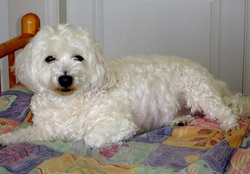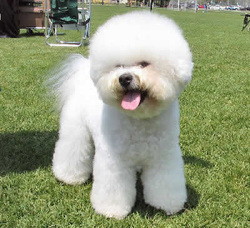Bichon-Frise (pronounced as "BEE-shon Free-ZAY")

ORIGIN:
The Bichon Frise dates back as far as the 13th century. The breed is a descendent of the Barbet Water Spaniel and the Poodle. The Bichon was traded all over the world by Spanish sailors. The dog eventually became a favorite of the 16th century French royal courts. Today the Bichon Frise is primarily a companion and show dog. The Bichon Frise was first recognized by the AKC in 1972.
DESCRIPTION:
The Bichon Frise is a small, sturdy, little dog. When the dog is clipped in a show cut the body gives off a round appearance. The skull is slightly rounded. The muzzle is shorter than the skull, is not pointed, with a slightly pronounced stop. The round eyes are black or dark brown. The ears are dropped covered in long hair. The teeth should meet in a scissors bite. The legs are straight and medium boned. The tail is carried over the back. The double coat is soft to the touch. The outer coat is 3 to 4 inches (7-10cm.) long and is coarser and curlier than the soft dense undercoat. Coat colors include solid white, cream, gray or apricot. White is preferred in the show ring. The coat is hypo-allergenic. Pet owners usually clip the dog in an easy care puppy cut that is the same length all over the body. The dog can be shown with it's coat clipped like a poodle or with a long, puffy coat with the feet and muzzle clipped.
TEMPERAMENT:
The Bichon is a fluffy, little white dog that loves human company. It has an independent spirit, is intelligent, affectionate, bold and lively. This charming, gentle dog is not a yapper. It has a self-assured, happy temperament that is easy to live with. These bright little dogs are easy to train and just plain old love everyone. They need people to be happy. They are naturally sociable and are happiest when they are part of a family that takes them everywhere. This sociable trait also means that they are fine in the company of other dogs & pets and are excellent with children. Used as watchdogs and to perform tricks, this breed is competitive and obedient. Like a lot of smaller breeds, the Bichon may be difficult to housebreak. The Bichon Frise needs rules to follow, and limits to what they are and are not allowed to do. They also need a daily walk. Do not allow this little dog to develop Small Dog Syndrome, a human induced behavior, where the dog feels he is pack leader to humans. This can cause varying degrees of a wide variety of behavior problems, including, but not limited to, obsessive barking, guarding, separation anxiety, snapping, and even biting. These are not Bichon traits, but rather behaviors brought on by the way the dog is treated. If you begin to be your dog's pack leader, and are self assured, calm consistently and assertive towards the dog, providing daily pack walks, the Bichon will be a very stable minded, trustworthy dog.
The Bichon Frise dates back as far as the 13th century. The breed is a descendent of the Barbet Water Spaniel and the Poodle. The Bichon was traded all over the world by Spanish sailors. The dog eventually became a favorite of the 16th century French royal courts. Today the Bichon Frise is primarily a companion and show dog. The Bichon Frise was first recognized by the AKC in 1972.
DESCRIPTION:
The Bichon Frise is a small, sturdy, little dog. When the dog is clipped in a show cut the body gives off a round appearance. The skull is slightly rounded. The muzzle is shorter than the skull, is not pointed, with a slightly pronounced stop. The round eyes are black or dark brown. The ears are dropped covered in long hair. The teeth should meet in a scissors bite. The legs are straight and medium boned. The tail is carried over the back. The double coat is soft to the touch. The outer coat is 3 to 4 inches (7-10cm.) long and is coarser and curlier than the soft dense undercoat. Coat colors include solid white, cream, gray or apricot. White is preferred in the show ring. The coat is hypo-allergenic. Pet owners usually clip the dog in an easy care puppy cut that is the same length all over the body. The dog can be shown with it's coat clipped like a poodle or with a long, puffy coat with the feet and muzzle clipped.
TEMPERAMENT:
The Bichon is a fluffy, little white dog that loves human company. It has an independent spirit, is intelligent, affectionate, bold and lively. This charming, gentle dog is not a yapper. It has a self-assured, happy temperament that is easy to live with. These bright little dogs are easy to train and just plain old love everyone. They need people to be happy. They are naturally sociable and are happiest when they are part of a family that takes them everywhere. This sociable trait also means that they are fine in the company of other dogs & pets and are excellent with children. Used as watchdogs and to perform tricks, this breed is competitive and obedient. Like a lot of smaller breeds, the Bichon may be difficult to housebreak. The Bichon Frise needs rules to follow, and limits to what they are and are not allowed to do. They also need a daily walk. Do not allow this little dog to develop Small Dog Syndrome, a human induced behavior, where the dog feels he is pack leader to humans. This can cause varying degrees of a wide variety of behavior problems, including, but not limited to, obsessive barking, guarding, separation anxiety, snapping, and even biting. These are not Bichon traits, but rather behaviors brought on by the way the dog is treated. If you begin to be your dog's pack leader, and are self assured, calm consistently and assertive towards the dog, providing daily pack walks, the Bichon will be a very stable minded, trustworthy dog.
A Bichon in a 'show-cut'

I've contemplated a number of times on having Charlie groomed in a 'show-cut' but never pushed through with it for various reasons. Some sensible ones and some silly ones - i.e. it'll be too hard to maintain (too much combing/brushing), he'll look like a girlie-girl dog (ha-ha!! he'd hate that!!), he'll look chubbier than he already is, it's too expensive to have it done regularly, he'll look like a "generic" bichon, etc..etc..
I love the 'pet-cut' I have on him now. He looks 'macho'! :-)
I love the 'pet-cut' I have on him now. He looks 'macho'! :-)
